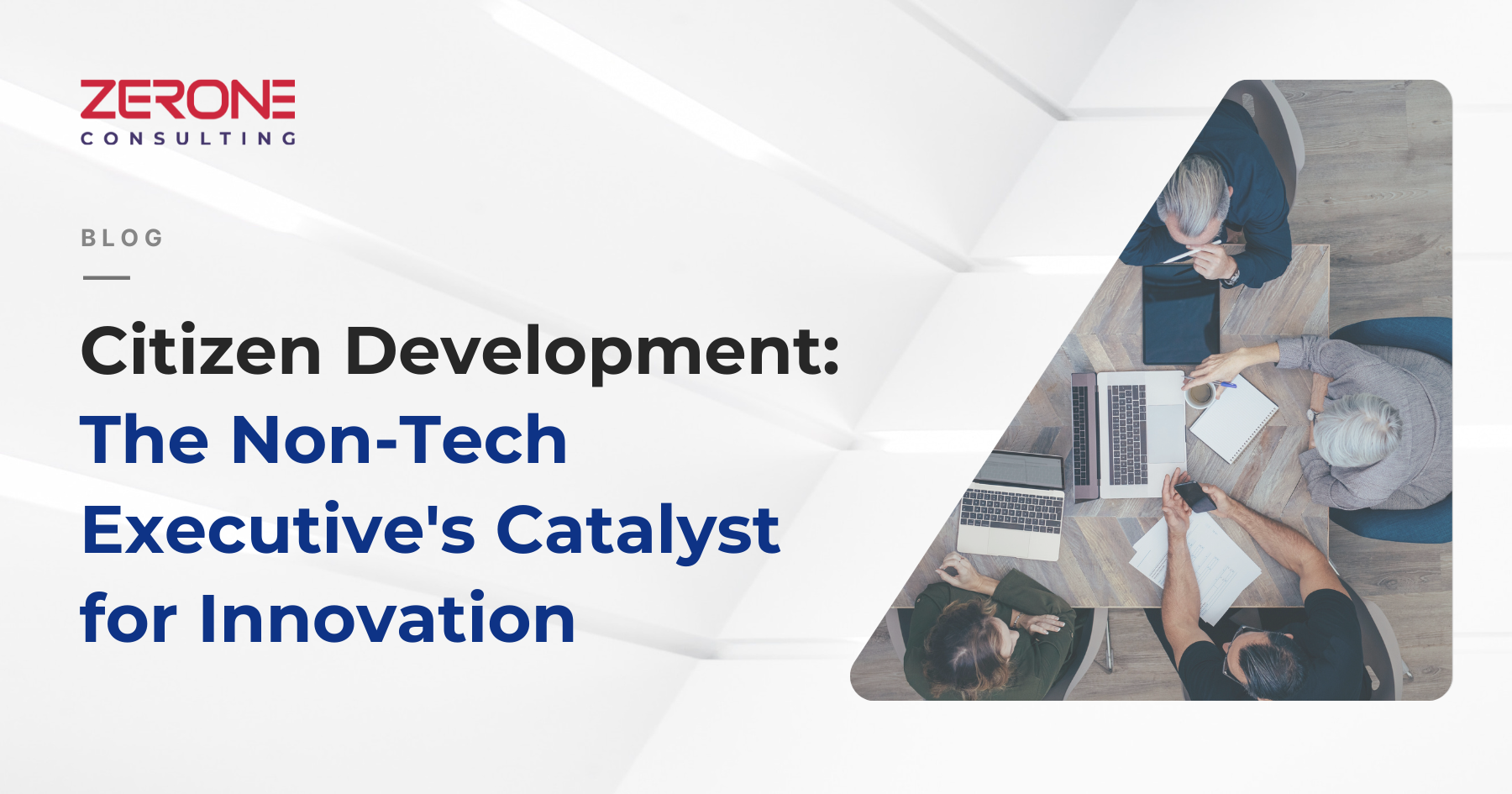Citizen Development : The Non-Tech Executive's Catalyst for Innovation
Innovation is the cornerstone of modern organizations striving for success. Traditionally, the responsibility for driving innovation has predominantly fallen on the shoulders of technical teams and developers. However, a transformative paradigm shift is in motion. The rise of citizen development is empowering non-technical executives to contribute actively to the creation of novel solutions. This powerful shift is driving the democratization of innovation and fostering a culture of inclusivity within organizations.

The Rise of Citizen Development:
Citizen development is the practice of enabling non-technical professionals to create or modify applications, processes, and solutions without deep programming skills. This empowering trend has gained momentum due to a multitude of factors, including the democratization of technology, the ever-increasing demand for business agility, and the need for rapid innovation. According to a Gartner forecast, by 2023, the number of active citizen developers at large enterprises will be at least four times the number of professional developers . This prediction underscores the rapid growth of citizen development, driven by the proliferation of user-friendly low-code and no-code platforms.

Benefits of Empowering Non-Technical Executives:
Empowering non-technical executives to partake in development activities bestows numerous benefits upon organizations. Firstly, these individuals bring a wealth of domain knowledge and unique perspectives to the table, enabling them to identify and address business challenges and opportunities that may be overlooked by the technical teams. Their active participation in the development process allows for the creation of solutions that are closely aligned with the strategic objectives and goals of the organization, promoting a culture of innovation that permeates throughout the entire company.

Real World Examples:
The effectiveness of citizen development is not just theoretical; it's been proven in the real world. One such example is Adidas. The sportswear giant has embraced citizen development initiatives, leading to the creation of numerous internal applications that streamline various business functions. These applications, developed by non-technical executives, are estimated to have saved the company around 9200 hours annually . This substantial time saving translates to cost efficiency and heightened productivity, demonstrating the tangible benefits of citizen development.

Building Support and Overcoming Challenges:
Despite the immense potential of citizen development, it does come with its share of challenges. These include resistance from traditional IT teams, concerns over quality control, and the need for proper training and support systems for citizen developers. Organizations can mitigate these challenges by initiating open conversations between IT and business teams, providing adequate training resources, and setting clear guidelines for citizen developers. An environment that promotes knowledge sharing, collaboration, and mentorship can significantly enhance the success of citizen development initiatives.
Empowering Non-Technical Executives: Best Practices:
For organizations to fully harness the potential of citizen development, it is critical to create a supportive environment for non-technical executives. Utilizing tools such as low-code and no-code platforms can facilitate this process. These platforms empower non-technical executives to develop applications and prototypes quickly and efficiently, bridging the gap between business needs and IT capabilities.
Collaboration between Business and IT:
The success of citizen development initiatives is largely dependent on effective collaboration between business and IT teams. Business leaders are tasked with articulating their requirements and objectives clearly, while technical teams provide their expertise in areas such as system architecture, security, and scalability. This symbiotic relationship allows for the efficient development of solutions that meet business needs while adhering to IT best practices.
Ensuring Security and Governance:
Security and governance are integral to the success of citizen development. It's imperative to establish clear guidelines and safeguards to protect sensitive data, ensure regulatory compliance, and maintain high-quality standards. According to a survey by OutSystems, 36% of IT professionals indicated that data security is a significant concern related to citizen development. Therefore, IT teams play a pivotal role in providing oversight and support to citizen development initiatives, ensuring that robust security measures are in place.
Looking to the Future:
The future of citizen development is incredibly promising. With the advent of emerging technologies such as artificial intelligence, machine learning, and automation, non-technical executives will be even more empowered to drive innovation within their organizations. The global low-code development platform market size is projected to grow from $13.2 billion in 2020 to $45.5 billion by 2025 . This forecast suggests that non-technical executives will have an increasingly robust suite of tools at their disposal to cultivate innovation and drive organizational success.
Conclusion:
Citizen development has surfaced as a potent tool for innovation, enabling non-technical executives to actively contribute to the development of solutions that drive organizational success. By creating a supportive environment, providing adequate training, fostering effective collaboration, and ensuring robust governance, organizations can fully embrace and benefit from the power of citizen development.
Finding The Right Match: When Scrum Works Best
#Customapplicationdevelopment
Mvps - A Silver Bullet In Software Development
#Customapplicationdevelopment
The Green Revolution: A Tale Of Technology Giants Striding Toward Sustainability
#Customapplicationdevelopment



